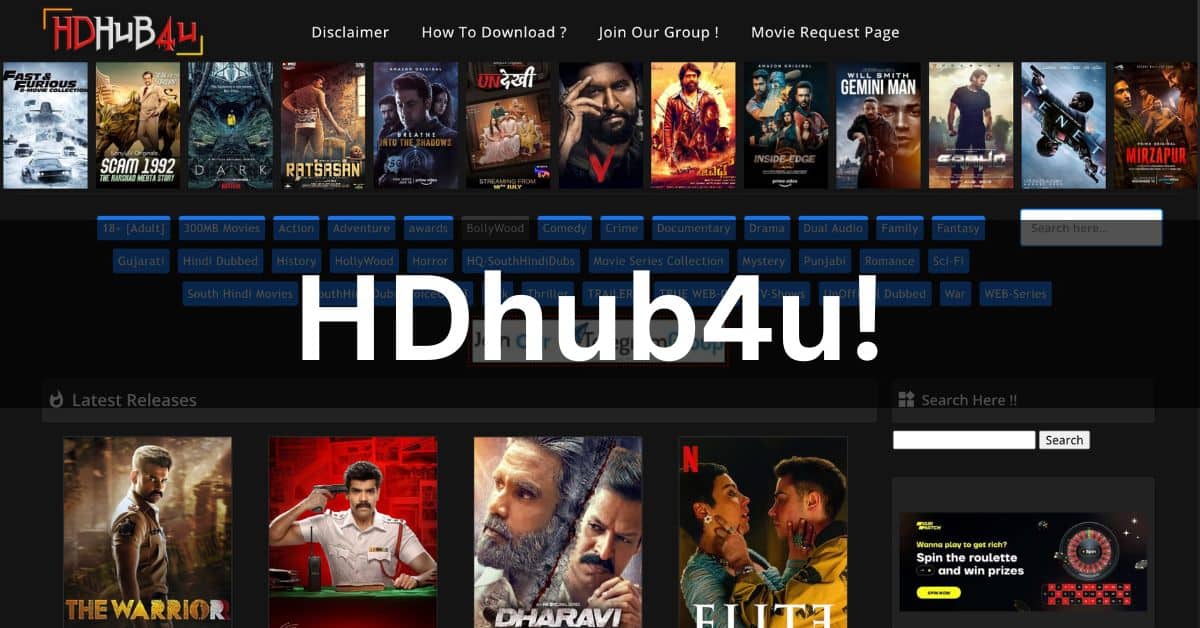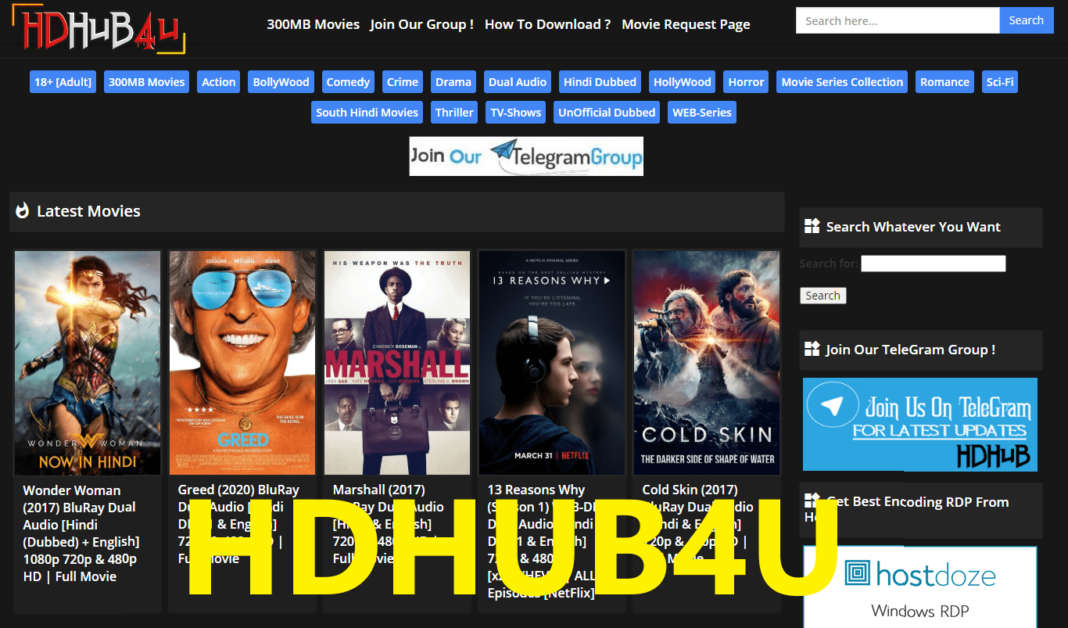HDhub4u Movie Download: India's Piracy Wave? Watch Legally!
Are we truly winning the war against online piracy, or is it a hydra, constantly regenerating with new heads? The relentless proliferation of movie download websites, like the burgeoning hdhub4u, suggests that the battle is far from over. This particular site is rapidly gaining traction in India, raising concerns about the accessibility and appeal of pirated content in the digital age.
hdhub4u operates as a torrent website, a familiar model in the realm of digital piracy. Its emergence highlights a persistent challenge for the entertainment industry. Despite the increasing popularity of Over-The-Top (OTT) platforms and the convenience they offer, piracy continues to cast a long shadow, fueled by illegal websites that provide unauthorized access to copyrighted material. The ease with which users can find and download content from these sites poses a significant threat to the revenue streams of filmmakers, studios, and legitimate streaming services.
| Category | Information |
|---|---|
| Website Type | Torrent Website (specifically for movie downloads) |
| Geographic Focus | India (reportedly gaining traction there) |
| Legal Status | Illegal (providing unauthorized access to copyrighted material) |
| Impact on Entertainment Industry | Contributes to piracy, negatively impacting revenue for filmmakers, studios, and legitimate streaming services. |
| Related Issues | Copyright infringement, potential malware risks for users, undermining of legitimate content distribution models. |
The rise of hdhub4u, and similar platforms, forces us to confront uncomfortable questions about consumer behavior and the perceived value of entertainment. Why, in an era of readily available and relatively affordable streaming services, do so many individuals still choose to engage with illegal websites? Several factors contribute to this phenomenon, including cost considerations, content availability, and the user experience offered by these sites. While legal streaming platforms often have geographical restrictions and fragmented content libraries, piracy websites frequently offer a wider selection of movies and TV shows, often including content not available through legitimate channels. The allure of free, readily accessible content can be difficult to resist, particularly for those who are price-sensitive or seeking specific titles that are not available on their preferred streaming services. The user experience, while often riddled with advertisements and potential security risks, can also be a factor. Some users find the interface of piracy websites to be simpler and more straightforward than the often-cluttered interfaces of legitimate streaming platforms. Furthermore, the ability to download content for offline viewing is a feature that is not always available on legal platforms, making piracy websites an attractive option for those with limited internet access or who prefer to consume content on the go.
- Kannada Films 2024 Top Grossing Movies You Cant Miss
- Kannada Movies 2024 Where To Watch Download Legally
The entertainment industry has responded to the challenge of piracy with a multifaceted approach, involving legal action, technological countermeasures, and consumer education initiatives. Copyright holders routinely issue takedown notices to search engines and internet service providers (ISPs), demanding the removal of links to infringing content. Anti-piracy organizations work to identify and shut down illegal websites, pursuing legal action against their operators. Technological measures, such as digital watermarking and content encryption, are employed to protect copyrighted material and track its distribution. Consumer education campaigns aim to raise awareness about the negative consequences of piracy, highlighting the financial harm it inflicts on creators and the potential security risks associated with downloading content from untrustworthy sources. However, these efforts have had limited success in eradicating piracy altogether. Illegal websites often reappear under new domain names, and users find ways to circumvent technological countermeasures. The cat-and-mouse game between copyright holders and pirates continues, with each side constantly adapting to the other's tactics.
The legal landscape surrounding online piracy is complex and varies from country to country. In many jurisdictions, it is illegal to download or distribute copyrighted material without authorization. Copyright infringement can result in civil penalties, such as fines and lawsuits, and in some cases, criminal charges. However, enforcement of copyright laws can be challenging, particularly in cases involving websites hosted in foreign countries. The difficulty of identifying and prosecuting the operators of these websites often allows them to continue operating with impunity. Furthermore, the sheer scale of online piracy makes it impossible to pursue legal action against every individual who downloads infringing content. Instead, copyright holders often focus on targeting the operators of illegal websites and the distributors of pirated material. The legal battles surrounding online piracy are often protracted and expensive, requiring significant resources and expertise. Despite the challenges, copyright holders remain committed to protecting their intellectual property and combating the spread of illegal content.
The rise of streaming services was initially hailed as a potential solution to the piracy problem. By offering a convenient and affordable way to access a vast library of movies and TV shows, streaming platforms were expected to reduce the incentive to engage in piracy. However, the fragmentation of the streaming market has created new challenges for consumers. With multiple streaming services vying for subscribers, users are often forced to pay for several subscriptions in order to access all of the content they want to watch. This can be expensive and inconvenient, leading some users to turn to piracy as a way to avoid paying for multiple subscriptions. Furthermore, some streaming services have geographical restrictions, meaning that certain content is not available in all countries. This can be frustrating for users who are traveling or living abroad, and it can also create an incentive to use VPNs or other tools to circumvent these restrictions. The fragmentation of the streaming market has also led to a decline in the availability of physical media, such as DVDs and Blu-rays. While physical media offer a higher quality viewing experience and the ability to own content outright, they are becoming increasingly difficult to find. This has further contributed to the appeal of piracy, as some users prefer to download content rather than rely on streaming services or physical media.
- Movierulz Is Free Movie Streaming Worth The Risk Years Insights
- Where To Watch Telugu Movies Online New Releases More
The economic impact of online piracy is significant, affecting not only the entertainment industry but also the broader economy. Piracy reduces the revenue of filmmakers, studios, and other content creators, leading to job losses and a decrease in investment in new productions. It also undermines the value of intellectual property, making it more difficult for creators to monetize their work. The loss of revenue from piracy can have a ripple effect throughout the economy, affecting related industries such as distribution, marketing, and retail. Furthermore, piracy can create unfair competition for legitimate businesses, as illegal websites offer content at no cost. This can make it difficult for legitimate businesses to compete, leading to job losses and a decline in economic activity. The economic impact of piracy is difficult to quantify precisely, but estimates suggest that it costs the global economy billions of dollars each year. In addition to the direct economic costs, piracy can also have indirect costs, such as the cost of enforcing copyright laws and the cost of educating consumers about the dangers of piracy. The economic impact of piracy is a complex issue with no easy solutions, but it is clear that it poses a significant threat to the entertainment industry and the broader economy.
The technological landscape is constantly evolving, and new technologies are emerging that could potentially be used to combat online piracy. Blockchain technology, for example, could be used to create a more secure and transparent system for tracking and managing digital content. Digital watermarking and content encryption are becoming more sophisticated, making it more difficult for pirates to remove or circumvent these protections. Artificial intelligence (AI) could be used to identify and remove infringing content from the internet more quickly and efficiently. However, pirates are also constantly developing new technologies and techniques to evade these countermeasures. The arms race between copyright holders and pirates is likely to continue for the foreseeable future. The challenge for the entertainment industry is to stay one step ahead of the pirates and to develop new technologies and strategies to protect their intellectual property. This will require a combination of legal action, technological innovation, and consumer education. It will also require a willingness to adapt to the changing technological landscape and to embrace new business models that can compete with piracy.
The debate over online piracy often involves ethical considerations. Some argue that piracy is a victimless crime, while others contend that it is a form of theft that harms creators and undermines the creative process. Those who defend piracy often argue that access to information and culture should be free and that copyright laws are too restrictive. They may also argue that piracy is a form of protest against the entertainment industry, which they see as being greedy and out of touch with the needs of consumers. Those who oppose piracy argue that it is a violation of copyright law and that it harms creators by reducing their income and discouraging them from creating new works. They may also argue that piracy is unfair to those who pay for content and that it undermines the value of intellectual property. The ethical considerations surrounding online piracy are complex and multifaceted. There is no easy answer to the question of whether piracy is right or wrong. Ultimately, each individual must decide for themselves whether they are willing to engage in piracy and whether they believe that the benefits outweigh the risks. However, it is important to be aware of the ethical implications of piracy and to consider the impact that it has on creators and the entertainment industry.
Addressing the problem of online piracy requires a comprehensive and collaborative approach involving governments, the entertainment industry, technology companies, and consumers. Governments can play a role by enacting and enforcing copyright laws, providing resources for law enforcement, and promoting digital literacy. The entertainment industry can invest in technological countermeasures, develop new business models, and educate consumers about the dangers of piracy. Technology companies can work to prevent the distribution of infringing content on their platforms and to develop tools that help copyright holders protect their intellectual property. Consumers can make informed choices about how they consume content and support legitimate creators and businesses. A collaborative approach is essential to address the complex and multifaceted problem of online piracy. By working together, stakeholders can create a more sustainable and equitable ecosystem for the creation and distribution of digital content.
Beyond the immediate issues of copyright infringement and revenue loss, the proliferation of websites like hdhub4u raises broader questions about the future of content consumption. The entertainment industry must adapt to changing consumer preferences and embrace new business models that can compete with the allure of free, readily accessible content. This may involve offering more flexible subscription options, experimenting with new pricing strategies, and developing innovative ways to engage with audiences. It also requires a commitment to protecting intellectual property and enforcing copyright laws, while simultaneously fostering a culture of respect for creators and their work. The future of content consumption will depend on finding a balance between the rights of creators and the needs of consumers, and on creating a sustainable ecosystem that supports the creation and distribution of high-quality content for all.
Movies Anywhere offers a compelling alternative by allowing users to watch movies online from various studios, including Disney, Fox, Sony, Universal, and Warner Bros. This platform aims to provide a centralized location for accessing legally purchased digital movies. Users can connect their digital accounts from services like Apple iTunes, Amazon Prime Video, Fandango at Home, Xfinity, Google Play/YouTube, Microsoft Movies & TV, Verizon Fios TV, and DIRECTV, importing their movie libraries into one convenient location. This aggregation of content addresses one of the key drivers of piracy the fragmentation of the streaming market and the need to subscribe to multiple services to access desired titles. By offering a single platform for managing and watching legally acquired digital movies, Movies Anywhere provides a user-friendly and convenient alternative to piracy.
Ultimately, the fight against online piracy is an ongoing challenge that requires a multifaceted approach. While legal action and technological countermeasures are important tools, they are not sufficient on their own. Education, innovation, and collaboration are also essential to creating a sustainable ecosystem for the creation and distribution of digital content. By working together, governments, the entertainment industry, technology companies, and consumers can create a future where creators are fairly compensated for their work and consumers have access to a wide range of high-quality content through legitimate channels.
- Movierulz Is Free Movie Streaming Worth The Risk Years Insights
- Kannada Movies 2024 Where To Watch Download Legally

HDHub4u.Joburg Your Ultimate Guide To Streaming Entertainment

Hdhub.4u Unlock The World Of Entertainment With Your Ultimate Guide

Explore The Ultimate HD Movie Hub Hdhub4u Official Website